

The Power of Trust with Sandra Sucher. Interviewed by Martin Reeves Sandra Sucher is a professor of management practice at Harvard Business School and an internationally recognized trust researcher.
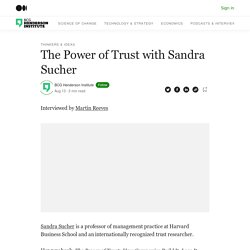
Her new book, The Power of Trust: How Companies Build It, Lose It, Regain It, co-authored with Shalene Gupta, is an exploration of the changing nature of trust. The book leverages interdisciplinary research, alongside key business case studies, to help elaborate on the four components of trust: competence, motives, means, and impact. In a conversation with Martin Reeves, Chairman of the BCG Henderson Institute, Sucher explains how companies, build, lose, and regain trust in today’s world, and suggests concrete steps for leaders to assess and enhance trust.
Reimagining Employee Experience. A lot has been said and written about Employee Experience (EX) over the years.
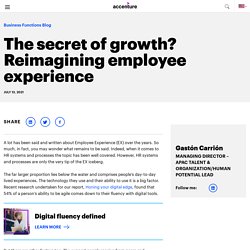
So much, in fact, you may wonder what remains to be said. Indeed, when it comes to HR systems and processes the topic has been well covered. However, HR systems and processes are only the very tip of the EX iceberg. The far larger proportion lies below the water and comprises people’s day-to-day lived experiences. The technology they use and their ability to use it is a big factor. Report: 100 Best Companies to Work For.
Agile Change Leadership Institute. Tool: Healthy Growth Check-up. The new possible: How HR can help build the organization of the future. Business leaders watching their organizations experience profound upheaval because of the COVID-19 crisis may find it difficult to understand what it all means until the dust settles.
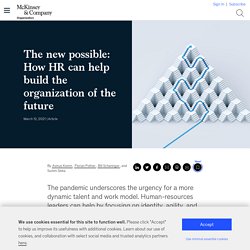
Audio But the pandemic hasn’t afforded them, or any of us, that luxury. Today’s skills, tomorrow’s jobs: How will your team fare in the future of work? Welcome to McKinsey Talks Talent, a podcast on the new science of talent, featuring McKinsey leaders and talent experts Bryan Hancock and Bill Schaninger.
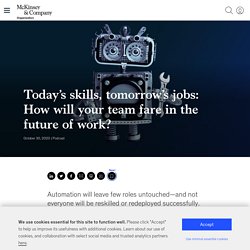
Change is a constant. We knew that even in the prelapsarian days before the outbreak of COVID-19. But we didn’t know how fast that change could happen. In the grips of the pandemic, companies and their employees have had little time to devise new ways of working. And the changes will keep coming: artificial intelligence, automation, augmented reality—all the technologies we’ve been talking about in recent years will become fair game. Decentralizing Your Operating and Talent Models the Right Way. As companies recognize that the timeline for moving past the impact of COVID-19 may lengthen into 2021 and maybe even beyond, key structures and processes within global organizations are coming under great strain.
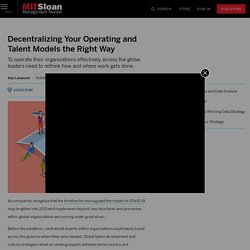
Before the pandemic, centralized experts within organizations could easily travel across the globe to where they were needed. Global talent development and culture strategies relied on sending experts between home country and international assignments, and on developing local talent that was subsequently deployed in other regions in order to develop a true global mindset.
Research Updates From MIT SMR. Decentralizing Your Operating and Talent Models the Right Way. How Chief People Officers Flip the Odds in Transformation. Take a Holistic, Enterprisewide Perspective—and Avoid Silo Thinking The temptation to take a silo perspective, which is common at large organizations to begin with, intensifies during transformations owing to the uncertainty and the possibility of personal job disruption.
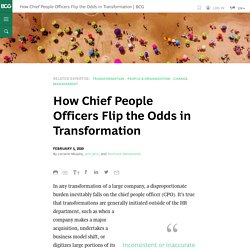
Indeed, transformations can lead to a kind of hunkering down, as though the transformation were a storm that has to be waited out. Filling in the employee experience blanks. It is remarkable that the biggest questions facing employers today are less about what they sell, or even who they sell to, and more about how they are perceived.
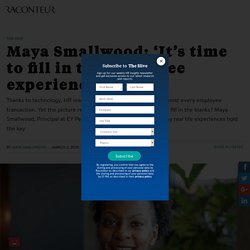
Organisations known for quality products, efficient execution and profitable growth are now being challenged by shareholders, customers, and communities to say more and do more – expectations from these stakeholders are higher than ever before. New questions are being asked: ‘What is your organisation’s actual role in the world?’ ‘What is your true and committed-to purpose?’ ‘How does your brand engender trust?’ Should you embrace personalisation in your workplace? At Moneypenny, a telephone-answering service for businesses, employees are made to feel special: they have their own desk area that they can personalise and a budget for a desk lamp of their choice.
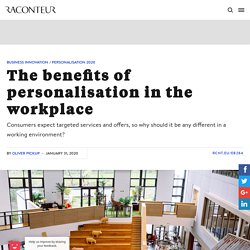
“Staff ideas form the design of our office, hence why there is a pub, a treehouse and an allotment,” says chief executive Joanna Swash. “Our core belief has always been happy staff equals happy clients and a company that doesn’t believe this on some level puts itself at risk.” Progressive organisations like this are arming employees with personalised tools, recognising these are now imperative to attract and retain talent. Digital HR Strategy: Achieving Sustainable Transformation in the Digital Age (2020) by Soumyasanto Sen. Why Companies Need To Elevate The Role Of People And Culture. As technology becomes more ingrained in our homes and lives, its uniqueness will always be about the human connection.
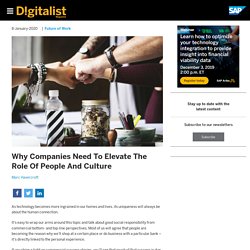
It’s easy to wrap our arms around this topic and talk about good social responsibility from commercial bottom- and top-line perspectives. Most of us will agree that people are becoming the reason why we’ll shop at a certain place or do business with a particular bank – it’s directly linked to the personal experience. If you shine a light on commercial success stories, you’ll see that much of that success is due to the people and culture. Getting the right talent at the right time is key to business success. Agile HR leadership: the APAC transformation challenge. To embrace agile HR, organisations need to transform.
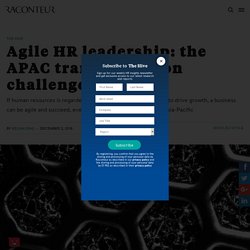
So, it’s no surprise that digital transformation is the buzzword on everyone’s lips, both in human resources and the wider world of business. But at the FUTR Asia Conference 2019 held in Singapore this October, a panel of senior HR executives cautioned that it is not about transformation for transformation’s sake, but for the potential benefits that it can bring. Key among these benefits is agility.
Exponential HR. The human resources function as we know it will hit a wall—if it hasn't already. The Future of Enterprise, Workforce, and How Work Gets Done have rapidly shaped a new Future of HR. A digital mind-set, relentless focus on the customer, advanced enabling technologies, and simplified, nimble ways of working are musts to achieve positive business outcomes. Organizational Agility Through Human Agility. Mike Griffiths Southern Alberta Chapter - September 16, 2019 Mike Griffiths is a consultant and trainer who help organizations improve performance through shared leadership, agility and (un)common sense.
He maintains the blog LeadingAnswers.com. Businesses do not transform, people do Company office buildings do not morph into new shapes overnight, transforming the business within them. Instead, organizational change is first mental, then we can change strategy and start doing things differently. So, business transformation is about changing minds and then actions. Wanted: Agile Workforce to Deal with Agile Industry. Mike Donoghue - September 18, 2019 Mike Donoghue is a member of a multinational information technology corporation where he collaborates on the communications guidelines and customer relationship strategies affecting the interactions with internal and external clients. He has analyzed, defined, designed and overseen processes for various engagements including product usability and customer satisfaction, best practice enterprise standardization, relationship/branding structures, and distribution effectiveness and direction.
If You Want Engaged Employees, Offer Them Stability. Executive Summary Most organizations struggle to find the right balance between stability and change, which in turn affects individual contributors. But in the race for innovation and digital transformation, the idea of stability has been somewhat lost in the mix, and there are strong indications that we should revisit its merits. If you want to develop an environment where contributors thrive, your workforce must be able to count on some basic things — such as role clarity, timely feedback, adequate resource allocation, and attention to how our work is structured.
Measuring human relationships and experiences. With the lines between enterprises' stakeholders—customers, workers, and partners—blurring rapidly, creating a good human experience could begin with putting in place a holistic strategy to measure this experience. “It would be wonderful if we could have a common framework that applies across customer, partner, and workforce. If there is a common way to think about 'experience' across all three parts of the ecosystem, this could drive an enterprise’s competitive advantage.”1. The Power of Habit—Cut Career Transition Time and Costs Through Accelerated Habit Change (On demand webinar)
People analytics: A power tool for business challenges. 2019 Global Human Capital Trends. From Brexit to Reward Management: How Can HR Cope With Uncertainty? Livre Blanc : l'agilité, la nouvelle alliée du DRH. The Global Talent Crunch - Korn Ferry Focus. L’intelligence artificielle est-elle la solution à l’évolution des RH? Using Big Data in HR for Industry 4.0 Success - Korn Ferry Focus.
How People Analytics Can Help You Change Process, Culture, and Strategy. Les employeurs canadiens vont droit dans le mur! 80% des métiers que nous ferons dans 20 ans n’existent pas encore aujourd’hui ! Face au tsunami technologique qui est devant nous, face à la révolution de l'Intelligence artificielle, l’université doit bien plus que se réformer : elle doit se métamorphose.
Can More Flexible Workforces Solve Society’s Problems? Talent management as a business discipline: A conversation with Unilever CHRO Leena Nair.